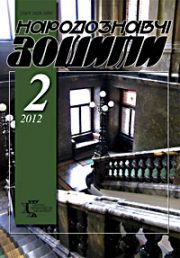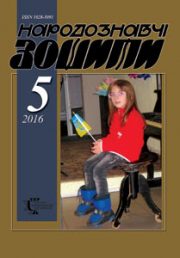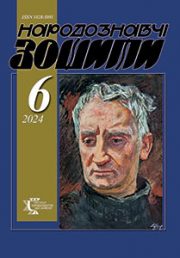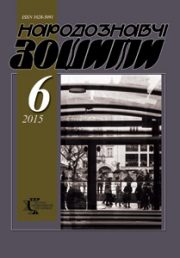The Ethnology Notebooks. 2024. № 5 (179), 1203—1214
UDK [398.88:398.322.41](=161.2:477.51)
DOI https://doi.org/10.15407/nz2024.05.1203
KOVAL-FUCHYLO Iryna
- ORCID ID: https://orcid.org/0000-0003-4048-9114
- Ph.D. in Philology, Senior Research Fellow
- Ukrainian and Foreign Folkloristics Department
- at the M. Rylskyi Institute of Art Studies, Folkloristics and Ethnology
- of the National Academy of Sciences of Ukraine,
- 1, Hrushevskoho str., 01001, Kyiv, Ukraine,
- Contacts: e-mail: koval-fuchylo@ukr.net
Abstract. In December 1943 in Moscow Dovzhenko made the recordings from his mother. These are 32 song texts of Ukrainian folk Christmas carols, spring rite carols, and lyrical songs. The records are contained in a separate notebook, which consists of 30 sheets. The name of the collection is «Mother’s Songs». It is kept in the Central State Archive of Literature and Art of Russia in Moscow. The purpose of the publication is to describe the motives of these song texts in the context of the Ukrainian song tradition, to list the variants of these folk works, to indicate the list of publications of each text, to summarize the plot and motive features of Dovzhenko’s collection. The relevance of the research lies in the fact that the motives and plots of O. Dovzhenko’s folklore recordings were analyzed for the first time in the context of Ukrainian song folklore.
The purpose of the publication is to describe the motives of these song texts in the context of the Ukrainian song tradition, to list the variants of these folk motives, to indicate the list of publications of each text, to summarize the plot and motive features of Dovzhenko’s collection. The object of research is the recording of Ukrainian folk songs by Oleksandr Dovzhenko from his mother, as well as various publications of these texts, motives and plots of folklore song texts in Oleksandr Dovzhenko’s recordings.
Research methods are determined by modern requirements for the analysis of folklore texts; the method of area research was used to describe the local song tradition; the comparative method, as well as the philological text-plot analysis of motives and plots, were used to identify plot parallels in song texts.
Records of Christmas carols from the collection of O. Dovzhenko contain motifs and plots characteristic of Volhynia, Podillia, and Slobozhanshchyna. Most often, these are songs for the owners and their children, for a young man, a girl, less often motifs with biblical characters, which were formed under the influence of folk tradition. Almost all ritual song of the winter cycle have variants in Zorian Dolenga-Khodakovsky’s collection of recordings. There is a rare carol plot about the Mother of God giving three names to the Son of God, as well as the motif of spring songs about the reflections of daughters who lament that without their father their luxuries will pass away.
Keywords: Oleksandr Dovzhenko, Christmas carols, song motifs, Christmas carol motifs, Chernihiv region.
Received 30.08.2024
REFERENCES
- Golubets, O. (2018). Dovzhenko Oleksandr Petrovych. Ukrainian folklore encyclopedia (Pp. 227—228). Lviv [in Ukrainian].
- Ivannikova, L. (2019). Dovzhenko Oleksandr Petrovych. Ukrainian folklore encyclopedia (P. 261). Kyiv: IMFE of the National Academy of Sciences [in Ukrainian].
- Polyarush, O. (1969). On the strong wings of a song (75th anniversary of the birth of O.P. Dovzhenko). Folk Art and Ethnology, 5, 53—61 [in Ukrainian].
- Polyarush, O. (1988). Oleksandr Dovzhenko and folklore. Kyiv: Vyshcha shkola [in Ukrainian].
- Soroka, I. (1961). One of the original sources of the work of O.P. Dovzhenko. Folk Art and Ethnology, 1, 89—91 [in Ukrainian].
- Pryhorovsky, V. (1992). From Dovzhenko’s well. Folk Art and Ethnology, 3, 56—58 [in Ukrainian].
- Pryhorovsky, V. (Ed.). (1995). The mother sang: Song world of O. Dovzhenko. Kyiv: Muzychna Ukraina [in Ukrainian].
- Pryhorovsky, V. (Ed.). (1995). From healing sources. The mother sang: Song world of O. Dovzhenko (Pp. 3—12). Kyiv: Muzychna Ukraina [in Ukrainian].
- The Central State Archive of Literature and Art of Russia. F. 2081. Op. 1. Od. save 330.
- Shcherbak, V. (Ed.) (1959). From the folklore heritage of O.P. Dovzhenko. Folk Art and Ethnology, 1, 126—128 [in Ukrainian].
- Sontseva, Y.I., & Pidsukha, O. (Eds.). (1964). Mother’s songs (Folklore collection of O. Dovzhenko). Folk Art and Ethnology, 5, 66—80 [in Ukrainian].
- Dovzhenko, O. (1959). Ukrainian song. Folk Art and Ethnology, 1, 126—127 [in Ukrainian].
- Yefremova, L. (2011). Frequency Catalog of Ukrainian Song Folklore: in 3 parts. Part 3. Indexes. Kyiv: Naukova dumka [in Ukrainian].
- Dei, O (Ed.). (1974). Ukrainian folk songs in the records of Zorian Dolenga-Khodakovsky (from Halychyna, Volhynia, Podillia, Dnipro region and Polissia). Kyiv: Naukova dumka [in Ukrainian].
- Yashchenko, L., & Mishchenko, K. (Eds.). (2005). Christmas carols. Kyiv [in Ukrainian].
- Dovzhenko, O., & Korohrodskyi, R. (Ed.). (1994). Lord, give me strength. Diaries, film stories, short stories, folklore records, letters, documents. Kharkiv: Folio [in Ukrainian].
- Ukrainian songs. Retrieved from: https://www.pisni.org.ua/songs/996683.html (access date: 07/14/2024) [in Ukrainian].
- Pylypchak, M. (Ed.). (2007). Christmas carols. Authentic. Kyiv: ZADRUGA [in Ukrainian].
- Ukrainian songs. Retrieved from: https://www.pisni.org.ua/songs/431137.html (access date: 07/14/2024) [in Ukrainian].
- Yefremova, L. (2010). Frequency Catalog of Ukrainian Song Folklore: in 3 parts. Part 2. Anthology-textbook. Kyiv: Naukova dumka [in Ukrainian].
- Yefremova, L. (2009). Frequency Catalog of Ukrainian Song Folklore: in 3 parts. Part 1. Description. Kyiv: Naukova dumka [in Ukrainian].
- Ukrainian songs. Retrieved from: https://www.pisni.org.ua/songs/https://www.pisni.org.ua/songs/3388766.html (access date: 07/14/2024) [in Ukrainian].
- Ukrainian songs. Retrieved from: https://www.pisni.org.ua/songs/https://www.pisni.org.ua/songs/230461.html (access date: 07/14/2024) [in Ukrainian].
- Ukrainian songs. Retrieved from: https://www.pisni.org.ua/songs/2150012.html (access date: 07/14/2024) [in Ukrainian].
- Ukrainian songs. Retrieved from: https://www.pisni.org.ua/songs/8394001. html (access date: 07/14/2024) [in Ukrainian].
- Pryhorovsky, V. (1993). «And in the master’s house and in his yard». An unknown recording of a carol from the archive of O. Dovzhenko. Folk Art and Ethnology, 1, 69—70 [in Ukrainian].
- (1961). Folk pearls. Ukrainian folk songs. Kyiv: State Publishing House of Fiction [in Ukrainian].
- Ukrainian songs. Retrieved from: https://www.pisni.org.ua/songs/215952.html (access date: 07/14/2024) [in Ukrainian].
- Ukrainian songs. Retrieved from: https://www.pisni.org.ua/songs/https://www.pisni.org.ua/songs/7186745.html (access date: 07/23/2024) [in Ukrainian].
- Koval-Fuchylo, I. (2014). Ukrainian laments: anthropology of tradition, poetics of the text. Kyiv [in Ukrainian].
- Ukrainian songs. Retrieved from: https://www.pisni.org.ua/songs/4311434.html (access date: 07/23/2024) [in Ukrainian].
- Yashchenko, L., & Mishchenko, K. (Eds.) (2007). Beautiful spring, quiet summer. Ukrainian folk calendar songs of the spring and summer season from the repertoire of the ethnographic choir «Homin» and the Kyiv Kobzar workshop. Kyiv [in Ukrainian].
- Ukrainian songs. Retrieved from: https://www.pisni.org.ua/songs/https://www.pisni.org.ua/songs/5386040 (access date: 07/25/2024) [in Ukrainian].
- Ukrainian songs. Retrieved from: https://www.pisni.org.ua/songs/https://www.pisni.org.ua/songs/8125219 (access date: 07/25/2024) [in Ukrainian].
- Ukrainian songs. Retrieved from: https://www.pisni.org.ua/songs/https://www.pisni.org.ua/songs/1251127 (access date: 07/25/2024) [in Ukrainian].
- A handwritten book-copy of the records of Zorian Dolenga-Khodakovsky. National Library of Finland. Collection of manuscripts. Ukrainian folklore. Sl.Ms 1001 [in Ukrainian].
- Koval-Fuchylo, I. (2024). A handwritten copy of the records of Ukrainian folklore by Zorian Dolenga-Khodakovsky in the collections of the National Library of Finland. Musicological opinion of the Dnipropetrovsk Region: Collection of sciences. Articles (Issue 26 (1), pp. 188—203). Dnipro: HRANI [in Ukrainian].
- Ukrainian songs. Retrieved from: https://www.pisni.org.ua/songs/https://www.pisni.org.ua/songs/6309042 (access date: 07/25/2024) [in Ukrainian].
- Ukrainian songs. Retrieved from: https://www.pisni.org.ua/songs/https://www.pisni.org.ua/songs/4278333 (access date: 07/25/2024) [in Ukrainian].
- Ukrainian songs. Retrieved from: https://www.pisni.org.ua/songs/https://www.pisni.org.ua/songs/7253343 (access date: 07/25/2024) [in Ukrainian].
- Ukrainian songs. Retrieved from: https://www.pisni.org.ua/songs/https://www.pisni.org.ua/songs/3386663 (access date: 07/25/2024) [in Ukrainian].







